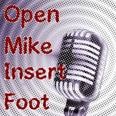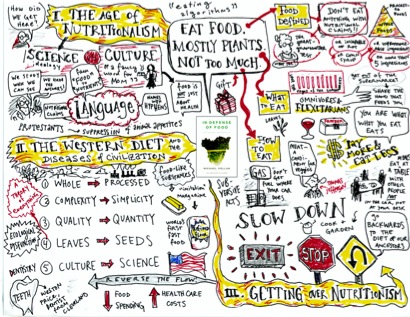Open Mike Night

"There's a show going down tonight
It's the hottest show in town
Down to that Gypsy Cafe
Where the freeway turns around
Once a week or so you know
These people show up to play
And they're gonna be stars someday
They're gonna be stars someday!"
Going Organic

In the last installment, I introduced the character behind management-ism. The 'can't manage what can't be measured' mindset that seeks metrics for measuring everything. Peter Block once asked the question, "If performance appraisals are so good, why don't we perform them on our spouses?" We don't perform them on our spouses because we have better ways to assess the goodness of that relationship. In absence of relationship, though, where we merely inhabit roles and perform process scripts, managing by such metrics might seem to make all the sense in the world. The management-ist sees no contradiction in employing 360 degree feedback strategies. The rest of us certainly do!
Slip over here for more ...Abstractions

Continuing the investigation of the secular religion of Management-ism started
HERE, continued HERE and HERE ...The last installment introduced Dr. Bob Ironside, a General Practitioner who fled the managed care system to start a subscription-based health advocacy clinic, where his clients actively collaborate WITH him to maintain health rather than simply treat illness.
Dan Starr, in his comment on the third installment, noted that the HMO (Health MAINTENANCE Organization) concept originated in just this idea, a physician/client partnership focused positively, to maintain health and so reduce health care costs. It morphed into its opposite, where the object became negative, to reduce health care costs by aggressively "managing" allocation: dictating delivery terms, questioning diagnoses and treatment recommendations, and tightly limiting reimbursements to minimize costs. How maintaining health shifted into minimizing costs might serve as the general pattern defining the difference between the manager and the management-ist. Slip over here for more ...Surviving The Downturn

Last Tuesday, Amy and I convened a conversation. Sponsored by the local Chamber of Commerce to bring the business community together to consider: Surviving the downturn.
To our surprise, most reported no loss of lift, no panic. No one wore a barrel.
How does one take the temperature of a town? I'd spent the morning waiting with my dad while my mother was injected, inspected, reflected, and ultimately rejected for now: no obvious cause. Scheduled for continuing tests. Conclusions inconclusive.
Life, being holographic, presents herself in various equivalent disguises. Where ever I go, there she is. The phantom hitchhiker. "Say, isn't that the same woman we passed a hundred miles back?" Rod Serling authors every life.
So we convened, listening more than facilitating. Prepared to be changed by what we heard. What DID we hear? The conclusions inconclusive. More tests coming.
How to represent what we heard? One way is a word cloud- see above graphic. Another is word jazz, where the sound and shape and meter carry as much meaning as the words: see below-
Slip over here for more ...Off The Grid

This posting continues the story started
HERE and continued HERE. This third installment of my investigation of Managementism, the profoundly popular theology influencing everything from food production to health care, looks at one example of one practitioner who choose to step "Off The Grid."In the last installment, I introduced a doctor, Bob Ironside, who, dissatisfied with the management of the health care system he was a part of, took personal agency to make his part work much better. I was sitting in an extremely comfortable room—I would not call it a waiting room, because it was clearly not designed for any activity as wasteful as waiting—for a chat with Bob about his life off the grid.
Slip over here for more ...Getting Off The Grid

This post is the second installment in a series considering Management-ism, which I started here. I first met Bob Ironside in the early eighties. He was then a General Practitioner, working in a typical clinic he shared with a half dozen other docs. The waiting room was large enough to hold twenty or thirty patients. Staff worked behind a counter with a sliding glass window. A receptionist, several nurses, rows of shelves with patient files. The doctors saw patients in small rooms along a central hall, which was closed off from the waiting room by a door, guarded by one or another of the nurses. When a doctor was ready, a patient's name was called out, and the door to the examination rooms opened, and that patient was ushered down the hall.
How We "Managed" To Screw It Up

This entry might turn into a bit of a rant. My question, How did we manage to f@#^ up our age-of-Aquarius opportunity in the world? When I look around, I notice that, not only is my generation worse off than the prior one, it's worse off than the one before that! The next generation seems to be even worse off than mine was. How did we manage to do that? I just finished reading Michael Pollan's In Defense of Food, which continues his commentary, started in The Omnivore's Dilemma, on the sorry state of food production and distribution. He cites the close correlation between the introduction of what he calls Nutritionism and increases in everything from heart disease to attention deficit syndrome. Pollan speaks at length about the curious science of nutrition, which he claims more closely resembles a religion than a disciplined science. Post WWII, food became increasingly replaced by nutrition, typically vitamins and minerals added to a corn starch base and sold in lieu of food. This strategy enables industrial food producers to enjoy huge margins, but it ignored something important about food. Food apparently cannot be successfully separated from its context. We can't just distill a meal into a prescribed set of nutritional elements and expect to thrive. a) We don't yet understand what all the elements are and how they actually relate, and b) We have been misusing science to support the notion that we DO know what we actually do not. (Oh, and successfully lobbying to make this speculation the law of the land.)


